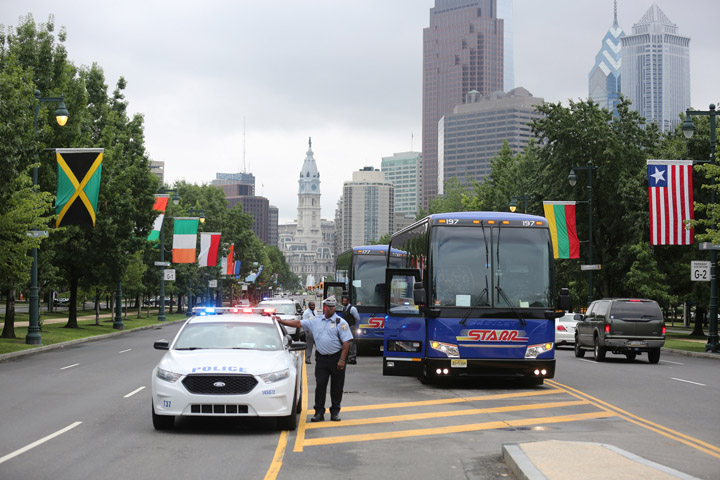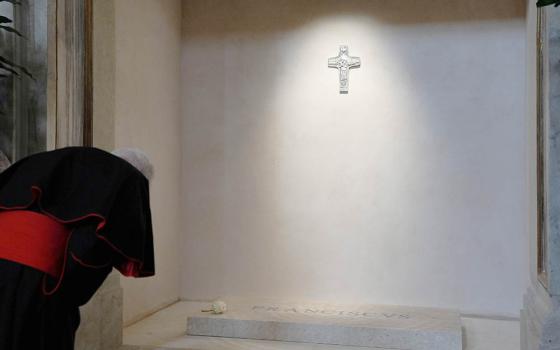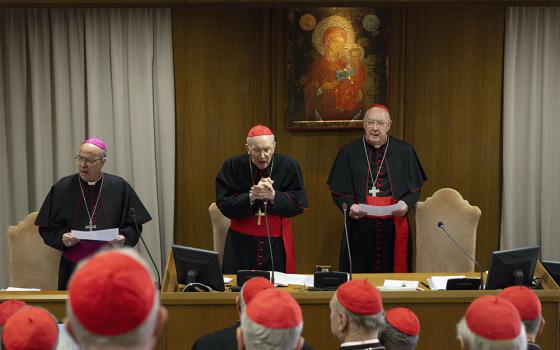
Members of the media gather near the Philadelphia Museum of Art along Benjamin Franklin Parkway in Philadelphia during a July 9 preview tour for Pope Francis' trip to the U.S. in September. (CNS photo/Bob Roller)
Mayor Michael Nutter of Philadelphia and other officials Aug. 5 described road closures, traffic restrictions and other transportation details for Pope Francis' September visit to the city.
The pope will be in Philadelphia the weekend of Sept. 26-27, which will conclude the Sept. 22-25 World Meeting of Families.
An area described as a "traffic box" will be designated in the center city starting 6 p.m. (Eastern time) Sept. 25. How long it will be in effect after the end of the papal Mass Sept. 27 has not been determined, but is likely to go into Sept. 28, depending on the number of people leaving the area of the Benjamin Franklin Parkway.
That is the location near the Philadelphia Museum of Art where the pope will celebrate the Mass for a projected 1.5 million people.
During that weekend, cars will be allowed to travel within the traffic box and leave it but will not be allowed back into the perimeter. The restrictions include personal vehicles and any sort of bus -- including motor coaches, school buses, mini buses, RVs and passenger vans with a capacity of eight to 14 people.
Pedestrians and cyclists, however, will face no restrictions leaving and re-entering the traffic box.
Only emergency vehicles will be exempted from the restrictions, and they will have designated travel lanes as streets begin to fill with pedestrians walking to the papal events.
CatholicPhilly.com, the news site of the Philadelphia Archdiocese, has details on the borders of the traffic box.
Nutter admitted the restrictions may create challenges for those living or working in and around center city but he presented the information with optimism, noting that of any location in the world, Vatican officials in 2012 chose Philadelphia for the site of the World Meeting of Families that traditionally concludes with a visit by the pope.
"We as a city, we are the chosen people. We are the chosen city," the mayor said. "Yes, we will face challenges, but we will overcome them together as a city, region and community. This is our moment in time, our moment to shine on a national and international stage."
Various city and state officials also presented information on how visitors would get to that stage on the last weekend of September.
Leslie Richards, secretary of the Pennsylvania Department of Transportation, or PennDot, said several area highways -- key arteries into the city from southeastern Pennsylvania -- would close effective 10 p.m. (Eastern time) Sept. 25.
One option for visitors from New Jersey put to rest some speculation that had arisen in recent weeks: the Ben Franklin Bridge, spanning the Delaware River from Philadelphia to Camden, New Jersey, will be closed 10 p.m. (Eastern time) Sept. 25 through noon Sept. 28.
John Hanson, CEO of the Delaware River Port Authority, said only emergency vehicles will be permitted to drive across the bridge. But pedestrians able to walk to Philadelphia will have free use of the span.
Those wanting to ride a train into town for the papal events had to place their name into a lottery Aug. 3 for one-day papal passes on SEPTA's Regional Rail lines. (SEPTA is the Southeastern Pennsylvania Transportation Authority.)
Joe Casey, general manager of SEPTA, explained how the transportation agency intends to more than double its normal train passenger capacity, up to 350,000 for the weekend. He said the lottery system for passes ran successfully, he noted.
All winners of the lottery were being notified Aug. 6 and were required to use a link to pay for their pass on the SEPTA website by Aug. 9. Any unsold passes will be distributed to those entrants who did not initially win the lottery.
A similar lottery was planned for two other transportation lines, the Sharon Hill and Norristown High Speed lines. The system's Airport line, he said, is the only one operating both inbound and outbound for the weekend for airline travelers.
Of all the travel options to the weekend's events, bus transportation appeared the most effective, a point underscored by an analysis of projected visitors.
An early estimate last spring projected some 5,000 buses would carry passengers into the city. Assuming 60 passengers per bus, 300,000 could be expected to use that means of travel, especially on Sept. 27 for the papal Mass on the parkway.
Indeed, many parishes in the Archdiocese of Philadelphia, plus church groups from the Northeast and mid-Atlantic regions, and beyond, have signed up busloads of pilgrims.
Adding another 175,000 people per day from the Regional Rail trains brings the total to 475,000.
Cars could bring in thousands more people, but major highway closures would leave local roads as drivers' only options. And once all those drivers arrive they would face challenge of parking. Buses will have priority ahead of cars, according to PennDot's Richards. That means drivers would have to seek parking farther from the sites of events, requiring a longer walk into center city.
Richards added that all available parking sites would be used, including the South Philadelphia stadium sites and across the river in Camden, and that more information on road transportation will be announced in coming weeks.
The dilemma for cars makes transportation by bus, because of its high passenger capacity, the ideal way to get into the city that weekend.
"It is the most effective and efficient way to travel," said Donna Crilley Farrell, executive director for the World Meeting of Families.
She stressed the importance of all commercial buses planning to transport visitors for papal events to get registered as soon as possible. Buses must register at wmof.goground.com by Aug. 31, and the bus operator is responsible for registration.
However people come into the city for the papal events, Nutter said, they should "be prepared to walk, for at least a few miles."
Food, water and other provisions in bags will be permitted at papal events, but they will be subject to security screenings.
Farrell noted that "all who wish to participate (in the papal events) can," especially since it will be a "transformative and unforgettable moment (for Philadelphia) on the world stage."
She echoed Nutter's assertion that the city has often pulled off large-scale events and managed transportation and security issues. But the difference this time is, "we're doing it all at once."
With enthusiasm, she expressed confidence that "we've done it before, and we've got this. Let's enjoy this and celebrate it."


